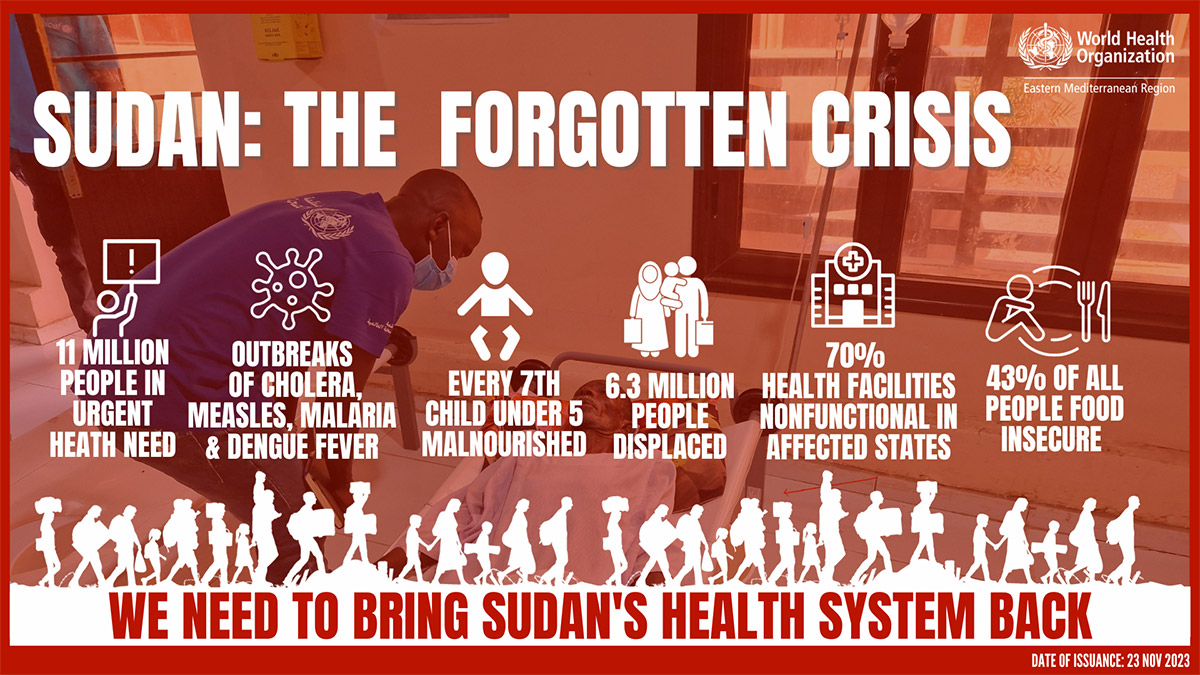
21 November 2023 – With the world’s attention having turned to the horrifying situation in Gaza, we must remember that the Sudanese people continue to face suffering on a scale that is also catastrophic.
The figures coming out of Sudan are staggering: nearly 25 million people need humanitarian aid and 11 million people need urgent health assistance. More than 20 million people have now fallen into high levels of acute food insecurity, and every seventh child under five in Sudan is acutely malnourished. Around 4.2 million women, girls and vulnerable populations face the risk of gender-based violence – which can be life-threatening – with limited or no access to protection services and support.
As fighting continues relentlessly across major parts of the country, especially in Darfur, Kordofan and Khartoum, the latest official figures we received on 3 November point to 32 679 injured people – and with so many areas now extremely hard to access due to insecurity, the real numbers are likely to be much higher. An estimated 70% of hospitals in the conflict-affected states are not working, and the remaining ones are overwhelmed by the influx of people seeking care, many of whom are internally displaced. With children representing about half of the 6.3 million people forced to flee the violence, Sudan is now the country with the largest child displacement crisis in the world.
We are gravely concerned about the situation in Darfur. Most hospitals are reportedly non-functional due to looting, damage and loss of staff, while insecurity prevents humanitarian aid from being safely delivered in the area. Nearly half a million people have fled Darfur into Chad, many in immediate need of medical attention, including trauma care. WHO offices in Sudan’s neighbouring countries – Chad, Egypt, South Sudan, Ethiopia and the Central African Republic – are working with national authorities and health partners to ensure delivery of emergency health care, essential health services and immunization services to the thousands of vulnerable people who have fled the violence. We are working hard with our partners to establish reliable cross-border humanitarian assistance to the more insecure areas, with the main priority being that provided from Chad to West and Central Darfur.
The skyrocketing humanitarian needs have been further complicated by a rapidly spreading cholera outbreak. Since the formal declaration of the outbreak in Gedaref on 26 September, seven states in Sudan have reported suspected cases and more than 3 million people are estimated to be at risk. Together with health authorities, WHO and partners are attempting to rapidly scale up response efforts to avert further spread, including training doctors and nurses in cholera case management and infection prevention and control. WHO has already dispatched 3.2 metric tons of cholera kits, including medicines, laboratory supplies and equipment, and are fully supporting 10 cholera treatment centres in Gedaref, Al Jazirah and Khartoum states. Working closely with government health authorities and UNICEF, WHO has also supported microplanning for a cholera vaccination campaign in nine localities in the same states. On 14 November, 2.9 million doses of oral cholera vaccines touched ground for a campaign expected to launch at the end of the month in six localities in Gedaref, and later in one locality in Al Jazirah and two localities in Khartoum.
WHO is also prioritizing support to 80 hospitals in the 18 states to ensure that communities have access to essential health services, including emergency obstetric care. WHO is working with partners to maintain primary health care in addition to directly supporting 21 fixed/mobile clinics. WHO is also supporting 57 nutrition stabilization centres, with nine WHO nutrition experts on the ground supporting the response to malnutrition, while treatment kits for more than 20 000 patients with severe acute malnutrition have been distributed to 16 of Sudan’s 18 states.
Insecurity and operational hurdles continue to pose a challenge to the timely delivery of supplies and services, however, as well as for disease control efforts. With 60 attacks on health care verified by WHO since the start of the war – targeting hospitals, clinics, laboratories, ambulances, workers and patients – we highly welcome the Statement of Commitments adopted in Jeddah on 7 November by parties to the conflict to protect civilians, facilitate unimpeded humanitarian access and establish a Humanitarian Forum for Sudan led by the UN Office for the Coordination of Humanitarian Affairs. However, with half of the attacks on health care having occurred since the first Jeddah Declaration signed on 11 May 2023, WHO urgently calls on parties to honour this promise. Attacks on health care must stop immediately – they severely disrupt the delivery of health care and further worsen an already desperate humanitarian situation.
Despite the high levels of insecurity, WHO has stayed and delivered since the start of the most recent escalation of conflict in Sudan, responding to health needs and tackling the multiple threats to health, including epidemics of cholera, measles, dengue and malaria. Our teams are working closely with their national counterparts and health partners to provide life-saving supplies, continuity of essential health care, expert advice, coordination of the many health partners, training, disease surveillance and outbreak response. Since 15 April, WHO has delivered over 260 metric tonnes of medicines and health supplies to national health authorities and health partners.
We sincerely thank our donors for enabling us to stand with our Sudanese brothers and sisters, thus manifesting our regional vision of “Health for All, by All”. But this major crisis is still largely overlooked by the global community. We need the scaled-up commitment and support of our donors so that we can expand our life-saving work in Sudan and meet the ever-growing and complex needs on the ground. The people of Sudan need the world’s solidarity and compassion like never before. Every delay costs human lives. The world cannot forget Sudan. The world cannot abandon Sudan.




